Is it OK to call this music "Gypsy jazz"?
"The term "gypsy jazz" may be considered offensive, as the word "gypsy" has historically been used as a slur against Romani people." Wikipedia
Well. This essay — I can't think of anything else to call it — is a re-write of an email conversation which I had with a venue owner early in 2024. I'm not going to tell you the name of the venue, or the name of the owner. But I'd like to sincerely thank this person for raising the issue of "the use of the word 'Gypsy' when talking about 'Gypsy Jazz'". We in FiddleBop describe our music as "Jazz-folk". So the "gypsy jazz" label is very very important to FiddleBop. It is central to how we present ourselves to the world. The last thing we want is to unintentionally hurt or annoy or anger anyone by using this description. Or even — and maybe this is not so far-fetched — be prosecuted for hate speech. Hence the need for a proper (and unavoidably long) discussion. It is mostly UK-focused, by the way.
_small.jpg)
Which is what you are now reading, folks.
So while it was a bit of a bolt from the blue (and a bit of work) to think about and then to write up this mini-tome on our use of the "gypsy jazz" phrase, still I'd like to say "Thank you[1] again, venue owner, for bringing this up". Later, it occurred to me that my email reply to the venue might be useful to anyone else who is asked the same question. So here it is, tidied up a bit from the original emails.
Before anything else, there is something that needs to be strongly emphasized. To be up-front. About myself[2] and the other FiddleBop musicians, so that you get an idea of where we are coming from. Context is everything! All four of us in FiddleBop absolutely — very very strongly — do not wish to offend or hurt or denigrate anyone. There is more than enough darkness in the world at present: one reason that we in FiddleBop play the music that we love is to bring a bit of joy to people. If we raise the mood of even one person in the audience, then we've achieved something good. (There is more "ad hominem" stuff at the end of this essay, if by any chance you get that far and are not bored by then.)
Next thing. This email was the first time that the use of "gypsy jazz" as an acceptable (or not) label for our music had come up for discussion, in FiddleBop's 20-some years of playing gypsy jazz gigs. Tho' I was taken aback on first reading the venue's "is-it-OK?" email, I shouldn't have been. Really, I should have seen this one coming 😎.
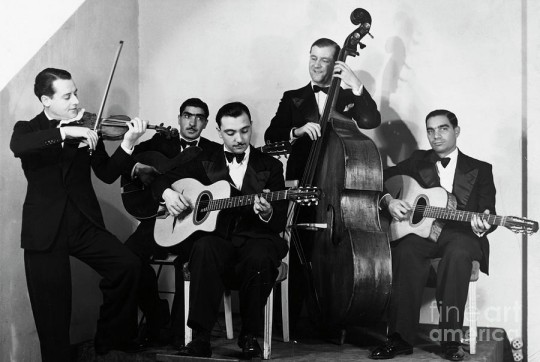
Right, so what have others said about the "gypsy jazz" term? First, taking "gypsy" on its own, the word does appear in Wikipedia's list of ethnic slurs. Along with — I must point out — several other much nastier ethnic slurs used against Roma folk. And this other Wikipedia article states that [Gypsy]
"...is often considered derogatory because of its negative and stereotypical associations. The Council of Europe consider that "Gypsy" or equivalent terms... are not in line with European recommendations".
But the same article also says that
"In Britain, many Romani proudly identify as "Gypsies", and, as part of the Gypsy, Roma and Traveller grouping, this is the name used to describe all para-Romani groups in official contexts."
Want more? The work of an early US activist who derides the use of "gypsy" is discussed here. And a more recent writer with a similar message is here.
So the take-home from the above appears to me to be that the use of the word "gypsy" is best avoided. Tho' not all Gypsies/Roma object, especially in the UK. But generally, the word "Roma" is best used instead. It isn't as simple as that tho', of course. (What is?) Another author says that context is everything:
"The terms Tsigane, Gitan, and Gypsy are all exonyms imposed by Europeans and have become more or less commonplace synonyms for Romanies. They are used by Romanies and non-Romanies (Gadjé) alike. Whether or not they are considered pejorative depends entirely on their contexts of use, and while some Romanies refuse these terms, many use them unproblematically."
Yup, context is everything: even those Roma who do not object to being called a Gypsy will of course object if the word Gypsy is paired with an insult word, or an insulting tone of voice[3]. Since there is no tone of voice in the written word, I have always chosen to show my respect for Gypsies by capitalising the first letter. Just as I would for the words British, Welsh, English, Scots, Irish etc.

Now considering the term "gypsy jazz". Wikipedia tells us that:
"Gypsy jazz (also known as gypsy swing, jazz manouche or hot club-style jazz) is a musical idiom inspired by the Romani jazz guitarist Jean "Django" Reinhardt (1910–1953), in conjunction with the French jazz violinist Stéphane Grappelli (1908–1997), as expressed by their group the Quintette du Hot Club de France. The style has its origins in France and the Manouche clan of Romanis, and has remained popular amongst this clan."
It also tells us that:
"The musical style was first named jazz tsigane in the French language, which translates to "gypsy jazz" in English. Some scholars have noted that the name "manouche jazz" began to be used around the late 1990s as a replacement term. The term "gypsy jazz" may be considered offensive, as the word "gypsy" has historically been used as a slur against Romani people."
OK, but the same article also says:
"What is called "gypsy jazz" today was not always played exclusively by Roma, even in its early days: of the original Quintette, only Django and his brother Joseph were Roma, and Django himself played in a non-Roma jazz context on many occasions. In addition, many later Roma guitarists—including Django's own sons Lousson and Babik—did not generally play gypsy jazz in the hot club style, although they were indeed gypsies who were playing jazz. Likewise, a number of today's gypsy jazz exponents are non-gypsies, in addition to the more well known Roma players. Thus, the term has become attached to the style of the music, rather than the ethnicity of the players. Django himself would not have known the term "Manouche jazz"; the Quintette was simply a popular jazz outfit of the day."

That's my emphasis in bold.
There is some impassioned discussion on the use of "gypsy jazz" or "gypsy swing" here and also here. A rather more measured essay is here. This bit of it is worth quoting:
"'Roma Jazz' is a popular choice for 'Anglo' venues that don’t want trouble brought to their business by displaying the 'G-word' on their music adverts. This decision however is largely uneducated. If we claim that this music originates with Sinti then we are erasing them from the story. Many Sinti prefer not to be called Roma as it is another group underneath the ethnic classification 'Romani'. I’ve been told by some that they would rather be called the 'G-word' or worse the 'Z-word' over being called Roma."
There is a lot more out there on this topic, of course. I've tried not to cherry pick.
To supplement these internet articles, I asked a few friends for their opinion. One friend of Jo's works with Roma folk building vardas ("gypsy caravans" — you see how difficult the terminology is!). He is closely involved with the Roma community. He told us that he has no problem with the use of "gypsy jazz". Next, we asked a fellow jazz musician (and a community councillor) in Oxford for her comment. She replied:
"As someone with Romany heritage I would not have any objections to gypsy jazz style. It is from pride we celebrate the music and culture. You are not posing as gypsies. Go for it!"

I also asked Sylvia Rushbrooke, former proprietor of Le QuecumBar "LONDON'S WORLD PREMIER GYPSY SWING - JAZZ MANOUCHE RESTAURANT/JAZZ VENUE".
Le Que sadly closed in 2023 after 19 years of supporting gypsy jazz. We've seen several Roma and non-Roma musicians there, and FiddleBop played there too a few times.
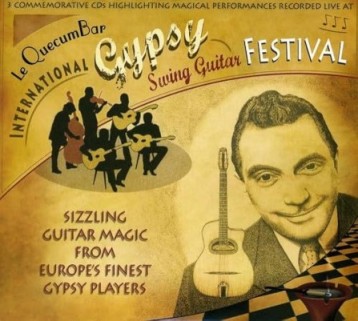
Le Que's website is still working, but maybe not Sylvia's email since I haven't yet had a reply from Sylvia. I'd hoped to by the time I wrote this. If I do get a response, I'll update.
Anyway, please note Le Que's prominent use of "GYPSY SWING" in their description.
The other thing I did was to post a question on the "Gypsy Jazz UK" group on Facebook.
"Hi all — is "gypsy jazz" still a socially acceptable term? What are the alternatives? Background: my band FiddleBop ("Jazz-folk") will be doing a gig at a new venue for us. However the venue owner is not keen on our use of the word "gypsy" in case someone finds it offensive. OK, but what are the alternatives? "Hot Club jazz", "Manouche jazz"... they are not going be understood by most people, certainly not by non-jazzers. So what to do? Dave F-M
We got quite a lot of replies: 139 at the time of writing this. Because the Gypsy Jazz UK" Facebook group is invite-only, there's no point in me posting a link here. (But I've done it anyway!) Instead, have a glance at the screen capture image on the right, which shows some of the discussion[4].
And the take-home from this opinion-gathering exercise? If it wasn't clear re. "gypsy", it is even less clear re. "gypsy jazz" and "gypsy swing". However it seems to me to be important to note that "gypsy jazz" does not refer to a person. It refers to a style of music. A style of music which was mainly created by two people in the 1930s. One of who (Django) was a Gypsy, one of who (Stephane) wasn't. And gypsy jazz was and is played by both Gypsies and non-Gypsies. For me, then, it is hard to see how "Gypsy jazz" can be seen as insulting by any Roma since the phrase does not refer to a person, but to a style of music originated in part by Roma/Gypsies.
Also, the relationship between the word "gypsy" and the phrase "gypsy jazz" is identical to the relationship between "black" and "black music", and between "negro" and "negro spiritual". Almost the same for "black" and "black lives matter", too. The first word of any of these examples could be — and sadly, sometimes is — used on its own as an insult to a person. However the first word in the two- or three-word phrases ("gypsy jazz", "black music", etc.) does not refer to a person, but to a thing. (I'm sure you can think of more examples...)
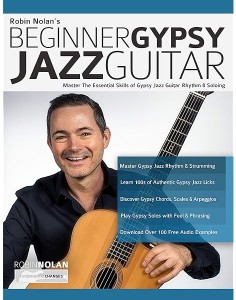
OK, you'll have gathered by now (if not before) that I don't object to the term "gypsy jazz". Indeed, for me the term pays succinct homage to the astonishing New Thing that resulted when Django and Stephane blended jazz with a Gypsy sensibility, Gypsy themes, and a Gypsy approach to musical virtuosity. The New Thing that I've devoted a good bit of my life to playing, in an attempt to do it justice.
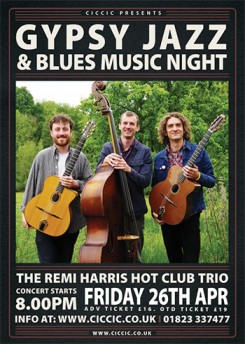
Maybe tho' a possible objection to "gypsy jazz" is that it is a form of cultural appropriation. I am not a Roma[5] so what am I doing playing gypsy jazz? Indeed, since jazz owes its origin to black people, what am I, a white person, doing playing any kind of jazz? The same goes for any other white person who plays jazz. Or blues. Or funk, or rap. (And by the same token, what was white-but-Roma Django doing playing jazz?)
This is an interesting article. Quoting from it:
"Is Jazz an example of “Cultural Appropriation”? By the Oxford definition, the answer appears to be, yes. But instead, let’s draw a difference between “cultural appropriation”, and consider Jazz a “cultural celebration” because Jazz is a celebration."
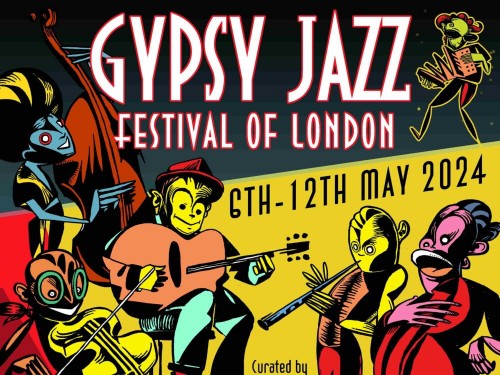
Louis Amstrong's statement on the universality of music is a pithy one:
"All music is folk music. Leastways I ain't heard no horse playing it."
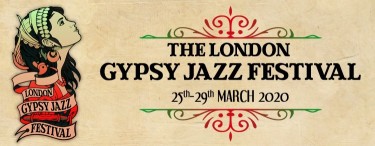
All that said, Roma/Gypsies have certainly been the subject of cultural appropriation. They still are: try doing a Google search for e.g. "gypsy dress". So I sincerely hope that we in FiddleBop are not appropriating Roma culture when we play Gypsy jazz. And I don't think we are. I'm heartened both by our Oxford friend's words:
"As someone with Romany heritage... You are not posing as gypsies. Go for it!"
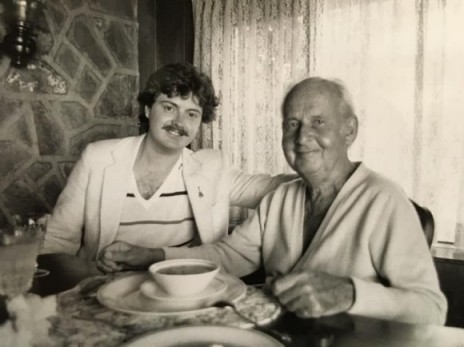
and also by the words of Martin Taylor MBE — who for many years made wonderful music with Stephane Grappelli — in the Facebook "Gypsy Jazz UK" discussion:
"I'm a jazz musician of Gypsy family heritage, so it’s fine with me 👍 a good accurate description."
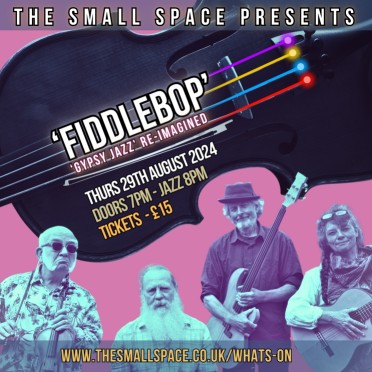
So where does all this get us? Let's say that FiddleBop should cease to use the phrase "gypsy jazz" (I'm not convinced, but this is a scenario). What could we use instead? Roma jazz? Jazz Manouche? Hot Club jazz? Django-style jazz? None of these would mean much to the Man On The Clapham Omnibus or to Worcester Woman. Even fans of mainstream jazz might not immediately know what was meant. The overriding problem with replacing "gypsy jazz" is lack of a viable alternative. So until I can find one, I'll stick with "gypsy jazz" because it does not seem offensive to me. But times change, and the meaning of words and phrases change too. Who knows what words and phrases we'll be using in 50 years time...?
Hey you got this far! Thank you.
Finally, a bit more "ad hominem" stuff. Think of this as a small "About the author" section 😃. Me and Jo are left-of-centre vegans, both decidedly "woke". We live in a barn on a hillside in mid Wales. As well as a jazz violinist, I'm also a geomorphologist/environmentalist.
Thanks again for reading this far! (If you did...)
- One thing I've learned (it took a long time!) is to be grateful for critique, being asked difficult questions etc. provided they come from a well-meaning source. (I still don't react well emotionally to being criticised, tho'! Ask my wife Jo... But I've slowly learned to see the huge value in receiving positive critique. After a short pause, that is.) ↩
- I'm somewhat aware of the human impact which incorrect terminology can have, since I lived and taught in Northern Ireland for 10+ years. ↩
- When I was young, I used to jam with some black guys from a nearby US airbase (marvellous musicians!) who jokingly would call each other the N-word if a less-than-perfect note was played. They would call me "honky" too, when directing me — wide-eyed, I'd never seen anything so decadent before — to their fridge-used-only-for-beer. It was all in fun. Context is everything. ↩
- Thank you very much, everyone who contributed to this discussion! If tho' you don't like your FB username appearing on the screen capture image, let me know at info@fiddlebop.org and I'll blank it out. ↩
- At least, I have no hard evidence of me having Roma ancestry. What a pity! But there was a family legend, on my father's side, that we were descended from Gypsy stock. Based on this, I speculated whether my paternal grandmother's surname Pavitt might have come from "pavee", a cant word meaning "Irish tinker". But I have no proof for any of this, despite tracing my ancestry back a fair way. Curiously tho', I had a DNA test recently which, totally unexpectedly, showed that I have a small percentage of Irish ancestry. But on my mother's side. O well, so much for family legends 😃. ↩





 info@fiddlebop.org
info@fiddlebop.org 01982 560726
01982 560726 Site map
Site map @FiddleBop
@FiddleBop @fiddlebop
@fiddlebop @FiddleBop
@FiddleBop Get our email newsletter
Get our email newsletter

